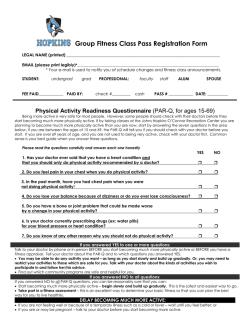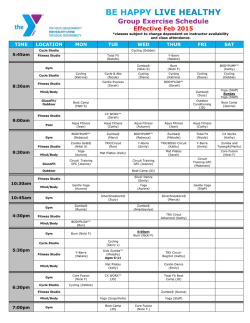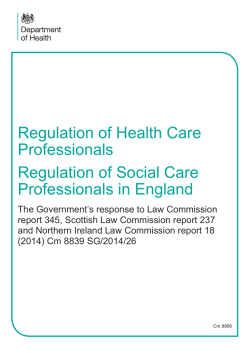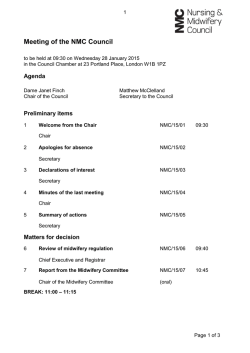
The General Medical Council (Fitness to
EXPLANATORY MEMORANDUM TO THE GENERAL MEDICAL COUNCIL (FITNESS TO PRACTISE AND OVER-ARCHING OBJECTIVE) AND THE PROFESSIONAL STANDARDS AUTHORITY FOR HEALTH AND SOCIAL CARE (REFERENCES TO COURT) ORDER 2015 2015 No. [XXXX] 1. This explanatory memorandum has been prepared by the Department of Health and is laid before Parliament by Command of Her Majesty. 2. Purpose of the instrument 2.1 3. Matters of special interest to the Joint Committee on Statutory Instruments 3.1 4. This Section 60 Order is intended to enhance and protect the independence of decision making at the adjudication stage of fitness to practise procedures involving doctors by establishing the Medical Practitioners Tribunal Service (MPTS) in statute. It also modernises, simplifies and clarifies a number of aspects of the legislative framework surrounding fitness to practise. It introduces a new overarching objective for the General Medical Council. Finally it amends the Professional Standards Authority for Health and Social Care’s grounds for referring final fitness to practise decision to the High Court for consideration and provides a right of appeal for the GMC against final fitness to practise decisions on the same grounds. None Legislative Context 4.1 The Medical Act 1983 (the Medical Act) governs the regulation of medical doctors working in the United Kingdom by the General Medical Council (the GMC). The GMC sets the standards of conduct, performance and behaviour that doctors are expected to meet in their practice. Where those standards are not met, the Medical Act enables the GMC to investigate and, if necessary, to restrict a doctor’s practice. These procedures are known as the fitness to practise procedures. 4.2 The GMC is required to both investigate fitness to practise concerns as well as to constitute fitness to practise panels to consider the evidence and adjudicate on whether a doctor’s fitness to practise is impaired and, if so, whether any restriction on their practice is required. They have rule making powers to enable them to address aspects of procedural detail, which are subject to approval by the Privy Council and the negative resolution procedure in Parliament. 5. 4.3 Section 29 of the NHS Reform and Health Professions Act 2002 provides for the Professional Standards Authority for Health and Social Care (the Authority) to refer final decisions reached by fitness to practise panels (which would in future be medical practitioner tribunals) to the High Court if they considered that the decision was unduly lenient. The High Court may dismiss the case, quash the decision, substitute a new decision or remit the case back to the fitness to practise panel which made the original decision. 4.4 Section 60 of the Health Act 1999 enables amendments to primary legislation governing the regulation of healthcare professionals including doctors by Order. 4.5 This section 60 Order amends the Medical Act and section 29 of the NHS Reform and Health Professions Act 2002. Territorial Extent and Application 5.1 6. This instrument applies to the whole of the United Kingdom. European Convention on Human Rights 6.1 The Parliamentary Under-Secretary of State for Health, Dr Daniel Poulter has made the following statement regarding Human Rights: In my view the provisions of the General Medical Council (Fitness to Practise etc) Order 2015 are compatible with the Convention rights. 7. Policy background 7.1 What is being done and why Reform of the GMC’s adjudication function has been a long term policy objective. Particularly the Fifth Report of the Shipman Inquiry recommended that the adjudication stage of the fitness to practise procedures be undertaken by a body independent of the GMC and that this body should appoint and train lay and medically qualified panellists and take on the task of appointing case managers and legal assessors as well as providing administrative support to hearings. Following the publication of the White Paper, Trust, Assurance and Safety in 2007, the Health and Social Care Act 2008 established an independent body called the Office of the Health Professions Adjudicator (OHPA) to adjudicate on fitness to practise cases involving doctors and opticians. However, following consultation in 2010, it was decided not to proceed with the establishment of OHPA and to instead strengthen the independence of decision making by fitness to practise panel and interim orders panels while retaining the adjudication function within the GMC’s governance structure and modernise the adjudication procedures. Parliament abolished OHPA in the Health and Social Care Act 2012. The section 60 Order is therefore intended to amend the Medical Act 1983 in the following ways: 1. Establishing the MPTS as a statutory committee of the GMC It specifies the MPTS’s powers, responsibilities and duties, strengthens the separation between the GMC’s investigation and adjudication arms, and places Medical Practitioners Tribunals and Interim Orders Tribunals under the administrative control of the MPTS. To provide a public record and demonstrate accountability the MPTS will be required to publish annual reports, which will also be laid before Parliament by the Privy Council. A register of the private interest of the MPTS will be maintained in the public domain. 2. Modernising the MPTS’ adjudication function including strengthening the case management arrangements The over-riding objective of the GMC when making rules relating to appointments to the MPTS and its tribunal procedures will be to secure that cases are dealt with fairly and justly. To enhance pre-hearing case management arrangements the MPTS will be able to appoint case managers in fitness to practise proceedings, including using the chair of a medical practitioner tribunal (where legally qualified) as case manager. To further support effective case management the MPTS will have power to award costs, draw adverse inferences and refuse to admit evidence following a party’s failure to comply with rules or directions or otherwise award costs for unreasonable behaviour. The MPTS will be able to appoint legal assessors in fitness to practise proceedings. The MPTS must appoint a legal assessor where the Tribunal chair is not legally qualified and will have discretion to do so in other cases. A legally qualified Tribunal chair will be required to inform the parties of certain advice given to the other tribunal members, including while they are considering issues in private, in line with similar requirements applicable to legal assessors. They proposals will enable reviews without a hearing, where both parties are in agreement as to the outcome, subject to power for a chair or tribunal to convene hearing. This will also apply to reviews of interim orders. To improve efficiency the GMC will be able to provide notification of decisions relating to fitness to practise by email rather than letter, when an email address has been provided for this reason. 3. Addressing patient safety issues and enhancing confidence and accountability The objectives of the regulator and their application in its fitness to practise procedures will be bolstered to expressly take account of the need to maintain public confidence in the profession and to maintain proper professional standards and conduct, in addition to protecting the health, safety and well-being of the public, within an over-arching objective of public protection. This new over-arching objective for the GMC will replace of their main objective, and there will be an express duty to have regard to it imposed on the Investigation Committee, when considering whether to give a warning or agree undertakings, and by Medical Practitioners Tribunals. The grounds on which the PSA can refer a fitness to practise panel decision to the relevant court will be amended to include express reference to similar factors to those included in the over-arching objective and new right of appeal for the GMC will be introduced subject to the same grounds. Provision will be made to ensure that in any case there will there can be only one such appeal or referral. The proposals make amendments to the Act in relation to professional performance assessments and include express provisions relating to health assessments, including provision for directions by Medical Practitioners Tribunals for non-compliance with such assessments to include up to 12 months suspension or up to three years conditional registration, and where relevant, corresponding amendments are made for knowledge of English assessments. The proposals will introduce a power for the GMC to request the disclosure of information or documents from a practitioner to assist with the investigation of allegations into that practitioner. Where a doctor fails to comply with such a request, the GMC will be able to refer the case to the MPTS for decisions as to whether to suspend that doctor or impose conditions for non-compliance on similar terms to those applicable to noncompliance in relation to assessments. The proposals will amend the review powers of fitness to practise tribunals, by introducing provision to ensure that reviews can be carried out before the expiry of tribunal directions. 4. Clarifying a number of areas of the Medical Act to make the procedures simpler to understand The Act will be amended to include specific rule-making powers for investigations to continue once MPTS proceedings have started and for cases referred to the MPTS to be withdrawn. The proposals amend powers to provide in rules for undertakings to be agreed by a practitioner and for the consequences of breaches, including specific provision for undertakings to be agreed during a fitness to practise hearing, after a finding of impairment has been made, and for a tribunal to take into account such undertakings. The proposals would make specific provision for assessments to support investigations into the fitness to practise of a doctor who has been erased from the medical register, but subsequently makes an application for restoration to the register. Provision will also be made to enable greater flexibility when carrying out professional performance and health assessments ton enable individual assessors instead of teams where appropriate and to enable the Registrar to direct the form and content of the assessment. The proposals amends the Act to include specific rule-making powers in relation to the rejection of vexatious allegations and allegations concerning facts that are more than five years old not to be investigated, except where investigation would be in the public interest, and the review of investigation decisions. We propose provision to ensure a direction for suspension or conditional registration will continue in effect during an appeal against a review decision until the final outcome of that appeal takes effect. 7.2 Consolidation The Law Commissions completed a wider review of the regulation of health and care professionals and made recommendations to consolidate and simplify the legislative framework. The Government is committed to consolidating and simplifying the legislation around health and care professional regulation when Parliamentary time allows. The Law Commissions’ recommendations included enabling greater separation of functions in the fitness to practise procedures between investigation and adjudication as well as other modernisations. We consider that making these amendments now in relation to the way that fitness to practise decisions is made about doctors is a priority. 8. Consultation outcome 8.1 The Department consulted on a UK-wide basis, on behalf of the four UK Health Departments on the draft section 60 order. 8.2 As the proposals relating to the changes to the Authority’s grounds for referral to the higher courts in respect of professions for whom responsibility is devolved in Scotland, the consultation was undertaken jointly with Scottish Ministers. . 9. 8.3 The consultation received 81 responses from a range of respondents including medical and legal professionals, healthcare recruitment organisations, regulatory bodies and members of the public. 8.4 A full Government consultation response report has been published at: https://www.gov.uk/government/consultations/changing-how-the-gmcdecides-on-doctors-fitness-to-practise Guidance 9.1 10. 11. Impact 10.1 The impact on business, charities or voluntary bodies is minimal as it relates to the processes for fitness to practise investigations and hearings for individual registrants. 10.2 The impact on the public sector is minimal as it relates to the processes for fitness to practise investigations and hearings for individual registrants. 10.3 An Impact Assessment has not been prepared for this instrument. Regulating small business 11.1 12. The Department does not intend to publish any guidance in respect of this SI. The GMC will publish guidance as appropriate. The legislation does not apply to small businesses. Monitoring & review 12.1 The Professional Standards Authority for Health and Social Care (PSA) conducts annual performance reviews of each of the health and care professional regulatory bodies. It is anticipated the PSA, when performing such reviews, will take into account the changes and provide insight into the effect of these measures. The Department will also keep these measures in view as part of its role in developing the professional regulatory landscape. 13. Contact Robert Duff at the Department of Health, Tel: 020 7210 5944 or email: [email protected], can answer any queries regarding the instrument.
© Copyright 2026






